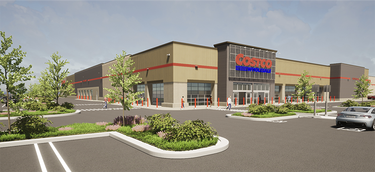Pyramid, once again facing Crossgates loan default, looks for approval of Costco project
GUILDERLAND — The Guilderland Zoning Board of Appeals at its upcoming meeting on May 3 appears poised to make a decision on Pyramid’s proposal to build a 163,000-square-foot Costco on 16 acres at the corner of Western Avenue and Crossgates Mall Road.
The site would also include an 18-pump gas station, enough parking for 770 vehicles, and eight electric-vehicle charging stations.
And with about $245 million in Crossgates loans set to mature this month, Pyramid is once again looking for ways to deal with creditors.
The zoning board at its April meeting heard the project proposal but declined to take action, choosing instead to process comments made by the public and to look into issues raised by its engineer.
A decision is anticipated at the board’s May 3 meeting.
The approximately 20 speakers at the public hearing on April 19 were pretty evenly divided in their comments about the project.
And as it’s done in the past for such public hearings, Pyramid was able to whip up support from local chambers of commerce, from Crossgates’ tenants, and their tenants’ employees, with at least 40 of the 100 the letters of support coming from someone who had previously expressed the same sentiment in writing.
Robert Lang, a long-time downstate Costco member, noted how a new Costco would improve the aesthetics of the area, but failed to mention who was responsible for its dilapidated state.
“I was just taking the ride in the back, they have all those abandoned houses there ... where Costco is planning to build, and that place looks terrible back there,” Lang said. “You know, it looks like a ghost town ... If Costco comes, they'll clear it out. It looks great.”
About 25 years ago, with plans to more than double the size of Crossgates, Pyramid started to secretly buy properties in a residential neighborhood near the mall. After the proposal was met with fierce public opposition and the town declined to approve needed zoning changes, the homes were eventually boarded up and allowed to fall into disrepair. The company is now proposing the homes be demolished as part of the new Costco project.
Karl Pogge, tenant of Pyramid, said Pyramid is “fueling our tax base.”
Robin Gray, who chairs the grassroots Guilderland Coalition for Responsible Growth, said she looked at the 13 Costcos in New York State, and save for two, they are all located in industrial areas. “This Costco is 160,000 square feet; there is no other building on Western Avenue that is of that size,” Gray said. “The size of this building is not congruent with any other building on this street.”
Gray then touched on taxes.
“In terms of taxes, Pyramid owns Crossgates, they’re all the same corporation,” Gray said. “And what have we learned in the last few years? What has happened? What has happened is they took us to court, they took the town to court. They sued us because they did not like their assessment.”
While the town of Guilderland and Pyramid were on the same side in court, successfully facing down lawsuits challenging the Costco proposal, they have been on opposite sides when it comes to assessing the value of Pyramid’s properties.
Crossgates began the first of its dragged-out tax certiorari proceedings against the town about 30 years ago, when the mall filed individual challenges to its assessments for the tax years 1993-1994, 1994-1995, 1995-1996, 1996-1997, and 1997-1998. Finally, in 2002, Guilderland moved to have the proceedings dismissed because Pyramid hadn’t filed any paperwork in the matter for four years.
In July 2022, Crossgates filed its third-straight Article 7 petition, requesting its assessed value be lowered by more than 50 percent, from $234 million — which the town had already reduced from $282 million — to $109 million.
“How can we trust this corporation, who has already sued us, to do the right thing and to pay their taxes as they are supposed to?” Gray said on April 19. “I think that’s something that we all need to think about.”
Financial issues
After receiving a pandemic-caused one-year reprieve from having to pay or refinance the totality of its Crossgates loans, Pyramid has had to deal with credit-rating agencies continually downgrading the debt.
Crossgates’ financials have taken a recent hit since rebounding from the pandemic. During the first nine months of 2022, the mall had had a net-operating income of $18.9 million, compared to $20.5 million for the same period in 2021.
Nearly $59 million of debt was downgraded in March by Fitch over concerns Pyramid would not be able to refinance the loan, and by Moody’s due to its imminent default. The remaining mortgages were downgraded by Moody’s in February and April because of their transfers to special servicing due to their imminent default.
But Moody’s also noted that, as of the April 2023 remittance date, the loan was current on principal and interest payments.
Guilderland’s zoning board cannot take into consideration Crossgates financial issues when making its decision about Costco, according to its former long-time chairman.
“People ... need to understand that the zoning board’s hands are somewhat tied by the legality of the issues, and what can be considered. For instance, the tax certiorari case from Crossgates,” Thomas Remmert, who stepped down as chair in December, said to the board on April 19. “They’re challenging their tax assessment; that’s between them and the town assessor.
“This board cannot consider the fact that Crossgates is suing the town over their assessment. That’s got nothing to do with Costco and the special-use permit; the board just can’t consider that. That’s just the way it is.”
Some say Remmert’s decision to speak displayed a serious breach of ethics. As a former paid member of the zoning board, Remmert is bound by the town’s employee handbook, according to Gray.
Gray pointed specifically to the town’s revolving door policy, which says, “A Town officer or employee who is required to file an annual disclosure statement pursuant to section 106, shall not appear or practice before the particular Town agency in which the Town officer or employee served or by which he or she was employed, except on his or her own behalf, or receive compensation for working on any matter before the particular Town agency in which the Town officer or employee served or by which he or she was employed, for a period of one (1) year after the termination of his or her Town service or employment; however, the bar shall be permanent for any Town officer or employee as to particular matters on which the Town officer or employee personally worked while in Town service that are still pending after the termination of his or her Town service or employment.”
Remmert declined to comment about the accusation.



